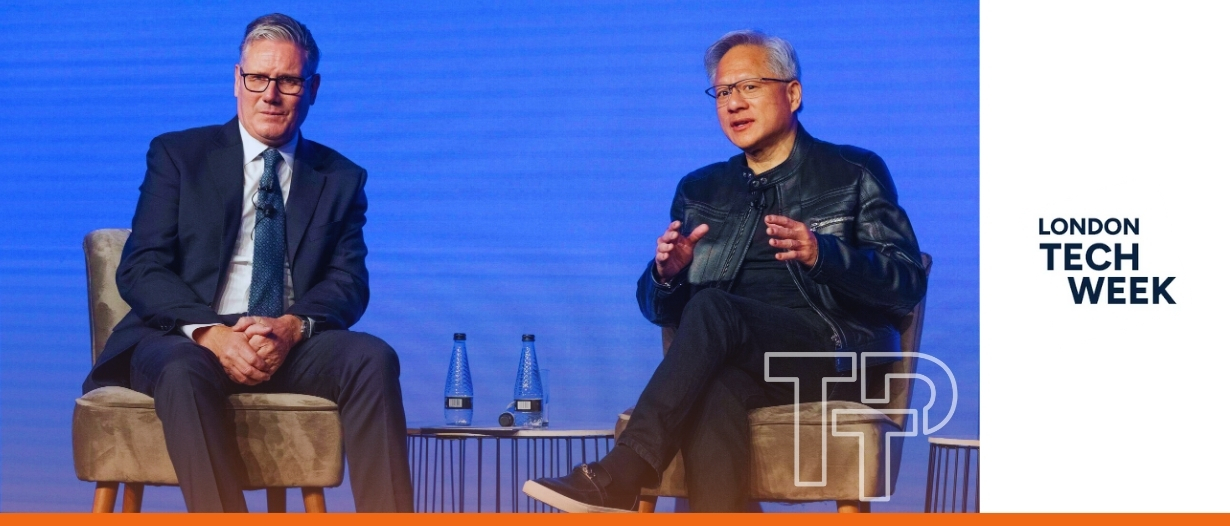New York adopts UCC Article 12, modernising law for digital asset transfers and electronic records
Deepesh Patel
Jun 12, 2025
 Eleanor Hill
Jun 10, 2025
Eleanor Hill
Jun 10, 2025

As London Tech Week opened with standing-room-only sessions and corporate commitments aplenty, Britain firmly positioned itself to become an AI mover and shaker in the global technology race. TTP reports on the topics du jour.
It’s safe to say that the 45,000 delegates attending London Tech Week 2025 from 128 countries weren’t expecting talk about fairytales. But that’s exactly what they got from keynote speaker Jensen Huang, CEO, NVIDIA. (Who was himself a fairytale – or at least dream – speaker with quotable gold dripping from his lips every minute).
In the classic tale he referenced, Goldilocks finds herself in a house where everything is either too hot, too cold, too hard, or too soft – until she discovers the porridge, chair, and bed that are ‘just right’. Huang cast the UK in a similar light, describing the nation as existing in a “Goldilocks circumstance” for artificial intelligence (AI): almost perfectly positioned, but missing one crucial ingredient.
Unlike the fairytale’s trespassing protagonist, the UK has most definitely been invited to make itself at home in the global AI ecosystem, with Huang and Prime Minister Sir Keir Starmer unveiling partnerships and investments that could transform Britain into what Starmer called an “AI maker, not an AI taker.”
Nevertheless, there is still much work to do to reach that goal. And Huang’s assessment was both flattering and pointed: the UK possesses world-class universities, brilliant AI researchers, innovative startups, and the third-largest AI venture capital ecosystem globally. “You’re the envy of the world,” he told the packed Olympia auditorium. Soberingly, though, he also described the UK as “the largest AI ecosystem in the world without its own infrastructure.”
This fundamental gap – a.k.a. the missing bowl of porridge – became the central theme of the day’s most significant announcements. Huang unveiled the launch of the first UK sovereign AI industry forum in partnership with major British firms. Founding members include BAE Systems, BT, Babcock, National Grid and Standard Chartered. And Starmer committed £1 billion in government investment to scale the UK’s computing power twenty-fold, addressing Huang’s fundamental point that “you can’t do machine learning without machines.”
The timing and symbolism were not lost on the crowds. Here was global tech royalty identifying both the UK’s extraordinary potential and its primary weakness, with the Prime Minister immediately responding with the largest computing investment in British history.
Starmer also spoke about AI applications in areas such as healthcare, while announcing a partnership with 11 major companies to train 7.5 million workers in AI skills by 2030.
Perhaps the Prime Minister’s most telling commitment, though, was his instruction to every government department: determine how AI and technology can transform your operations. Rather than pure political positioning, this was put forward as a mandate for wholesale modernisation of British governance.
The scale of ambition became clear through additional announcements, such as the £187 million ‘TechFirst’ programme which aims to boost tech skills nationwide by offering AI-focused training for young people, including one million secondary school students.
Meanwhile, the day’s corporate presentations demonstrated AI’s rapid evolution from experiment to essential infrastructure. Microsoft showcased remarkable adoption statistics, with Barclays deploying its AI tools to 100,000 employees worldwide and the NHS achieving 85% adoption rates with impressive productivity gains. Perhaps most significantly, the UK Government’s own Copilot trial across 20,000 civil servants showed nearly two weeks of time savings per FTE annually.
Interestingly, Microsoft also admitted that GitHub Copilot now writes 40% of the company’s code, enabling unprecedented product development velocity. Elsewhere, Amazon Web Services (AWS) brought a slightly different perspective, emphasising cultural transformation over pure technology adoption.
Focusing next on the UK and Europe’s competitiveness versus the US and China, expert panellists revealed both significant obstacles and unique advantages. CoreWeave’s Mike Mattacola highlighted a critical infrastructure challenge: UK energy costs represent 35-40% of data centre operations versus 15-20% elsewhere, directly impacting AI development affordability.
However, panellists including Baroness Martha Lane-Fox identified distinctive European strengths. The UK’s commitment to ethical business practices, diversity, and regulatory stability provides competitive advantages in an increasingly complex global environment. While American founders might demonstrate more aggressive marketing, European entrepreneurs often build more sustainable, thoughtful businesses, it was said.
The discussion also revealed concerning trends in capital markets, with European companies routinely raising majority funding from US investors due to valuation disparities, but also highlighted opportunities – if infrastructure and energy challenges can be addressed.
Throughout the day, skills development also emerged as the critical success factor as the UK looks to truly embrace AI. The government’s commitment to training 7.5 million workers represents an unprecedented public education initiative, building on existing programmes that have already reached over one million UK citizens.
Lane-Fox made a compelling case for extending digital literacy beyond technical workers to decision-makers throughout society – hospital administrators, school leaders, parliamentarians, and civil servants making budget decisions. Successful AI adoption requires understanding at all leadership levels, not just among engineers and developers.
The conversation also revealed generational advantages, with younger workers often demonstrating superior AI fluency, creating opportunities for reverse mentoring that combines institutional knowledge with technological capability.
In summary, day 1 of London Tech Week 2025 suggested that the UK has found its ‘just right’ moment for AI leadership – combining world-class talent, substantial investment commitments, and government support.
Unlike Goldilocks, though, the UK appears positioned to make itself permanently at home in the global AI ecosystem. The foundations have been laid, but now comes the harder work of building on them.

Deepesh Patel
Jun 12, 2025

Vincent Chin-Hsiang Yao
Jun 11, 2025
Trade Treasury Payments is the trading name of Trade & Transaction Finance Media Services Ltd (company number: 16228111), incorporated in England and Wales, at 34-35 Clarges St, London W1J 7EJ. TTP is registered as a Data Controller under the ICO: ZB882947. VAT Number: 485 4500 78.
© 2025 Trade Treasury Payments. All Rights Reserved.